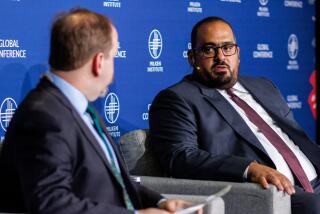A Center of World Worry
- Share via
With the second terrorist attack in a month on Saudi Arabia’s oil industry, it’s getting harder for the regime to blame its security problems on a handful of dissidents. For too long, the kingdom has vainly tried to use its oil wealth to paper over severe economic problems that are turning it into a hotbed of support for terrorists.
Sunday’s attack swept across a housing compound and two office complexes in Khobar, leaving 22 dead. The predictable result was another uptick in oil prices, which hit a 21-year high, if only briefly. The so-called security premium tacked on to the price of oil has been estimated at up to $10 a barrel. Many, including Britain’s ambassador to Saudi Arabia, say more attacks are likely, so the premium -- a measure of the risk of a supply cut -- probably will go higher and further strain the U.S. and world economies.
Simply imprisoning hundreds of suspects, as happened in the wake of the May 2003 car bombings that killed 34 people in Riyadh, won’t solve the growing problem. Oil accounts for 95% of Saudi Arabia’s export revenue, but the state-run industry accounts for less than 2% of the country’s jobs. Despite a second straight year of historically high oil prices, the oil-dominated economy can’t spin off enough jobs for the 150,000 Saudis entering the labor force each year. The result is unemployment among young males as high as 20% and heading higher, a perilous situation in a country that supplied 15 of the 19 hijackers in the 9/11 attacks. (Most women aren’t allowed to work, a separate serious economic problem.)
Saudi Arabia doesn’t generate enough oil profits to finance profligate spending by the royal family, a large defense force and the ever-increasing cost of serving as employer of last resort for Saudi citizens. It must encourage the creation of more privately owned companies outside the oil industry and improve its education system so more Saudis learn the skills needed for private-sector jobs. Saudi Arabia also lacks the economic strength needed to keep 6 million foreign workers in the country to fill jobs that its citizens refuse -- or are unqualified -- to fill.
OPEC’s decision on Thursday to raise oil output is good news for the global economy. So is the joint U.S.-Saudi decision to block assets of the Al Haramain foundation, which is suspected of financing terrorists. The United States must continue to press the Riyadh regime to work more closely with U.S. intelligence to stop the flow of Saudi money and citizens into terrorist groups. For its part, the Riyadh government must work harder on badly needed social and political reforms, starting with promised municipal elections in the fall.
It is not Saudi Arabia’s fault that the U.S. is failing to reduce its dependence on fossil fuels and that it lags behind other developed countries in requiring significant energy conservation. But what’s happening in Saudi Arabia is causing shivers around the world. It is deeply in U.S. interests to encourage a more vibrant and fairer society there.
More to Read
Sign up for Essential California
The most important California stories and recommendations in your inbox every morning.
You may occasionally receive promotional content from the Los Angeles Times.













